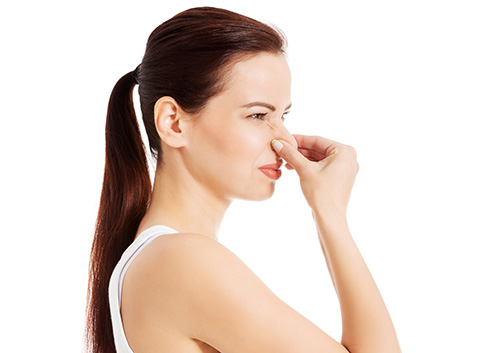February 7th, 2017

Inflamed gums are a fairly common dental issue, but unfortunately, many people don't take the problem seriously enough. If you ignore inflamed gums and continue your usual routine, you could be encouraging a much more severe inflammation problem, and the pain that goes along with that. Fortunately, it is quite easy to relieve inflamed gums if you use the tips below.
Use Soft Bristles
A soft-bristle toothbrush - the softest you can buy - is a must for anyone with inflamed gums. Anything that makes contact with your gums can cause you pain, so fine and soft bristles are always the best choice.
Use Sensitive Formula Toothpaste
The toothpaste marketed as “Sensitive Teeth Formula” contain special ingredients to help relieve sensitivity. When your gums are inflamed, even light brushing can cause some pain. Using a special toothpaste will help reduce that pain and make it easier to brush your teeth effectively. The effect becomes stronger as you use the toothpaste more, so use it for each brushing.
Visit Our Office
If your gums remain swollen for more than a few days or a week, set up an appointment with Drs. Ghenta and Mills. There is a long list of conditions that could be causing your swollen gums, everything from gum disease to pregnancy, so you need to find out where your issue is coming from. Most of the time, Drs. Ghenta and Mills can easily treat the swollen gum issue at our Dartmouth, MA office, or can give you an effective treatment to take home.
January 24th, 2017

Halitosis is the fancy, scientific word for “bad breath.” Drs. Ghenta and Mills and our team know there are several reasons why you may have halitosis; let’s look at a few:
- Gum disease (also known as periodontal disease) – There are five main types of gum disease, and each one can range from mild to severe. For example the most common one is gingivitis; it is caused by bacteria in the plaque that has been allowed to build up, usually as a result of poor oral hygiene. A more serious and uncommon type of gum disease is called necrotizing periodontal disease. It is most common in people who have a suppressed immune system.
- Smoking
- Dry Mouth – This can be caused by something as simple as a medication you take.
- Food – Of course, if you eat something that is potent like garlic, it is going to give you bad breath.
- Diseases of the Body – Some diseases such as sinus infections and diabetes, among a few other types of infections, can also cause you to have halitosis.
How to Get Rid of Halitosis
The most obvious answer to how to get rid of halitosis is to practice good oral hygiene, although, depending on the cause of halitosis it may not be that simple. If you have an infection that is causing the halitosis then you may need an antibiotic to clear up the infection and then the bad breath will go away. Here are more tips:
- Brush your teeth after every meal and before bed.
- Floss your teeth. The more plaque you get out of your teeth, the better chance you have of not getting cavities or bad breath.
- Address any medical conditions that are not related to your teeth that can be causing the halitosis.
- Ask Drs. Ghenta and Mills for a prescription mouthwash that kills bacteria.
Halitosis (bad breath) can be an embarrassing condition to live with, but there are plenty of ways to get rid of it permanently. Start by talking to a member of our team at our Dartmouth, MA office.
January 17th, 2017

Have you ever noticed your attention being instantly drawn to peoples’ teeth when they smile at you? Some people have dull and yellowing teeth, while others have teeth that appear bright white. Everyone’s teeth naturally dull over time because of aging and the contact your teeth have with staining foods, such as chocolate and coffee. However, teeth-whitening treatments can help you keep your teeth white for life.
Get Regular Treatments
The effects of teeth whitening or bleaching treatments are only temporary, so regular treatments at Ghenta and Mills Dental Group are necessary to keep your teeth white for life. Bleaching too frequently, though, can wear away your tooth enamel. The effects of in-office bleaching can last for several months to a year, while you may need to repeat your use of at-home bleaching kits every few months to maintain your white teeth. Whitening toothpastes do not contain bleach, so you can use them daily. The American Dental Association suggests asking your dentist for advice on which treatment is best for you.
Have Realistic Expectations
Not everyone’s teeth can be turned bright white, according to the American Dental Association. Your teeth may naturally be a light yellowish color that lends itself well to teeth-whitening procedures, but bleach is not likely to be effective for grayish teeth. Brownish teeth fall somewhere in between.
Practice Good Oral Hygiene
Your teeth whitening efforts will not be as effective if your teeth are in poor health. Visible fillings, implants, or bridges that are metallic stand out against the white color you want to achieve. You can help prevent tooth decay and reduce your risk of needing these unsightly treatments by maintaining a good oral hygiene routine. In addition to brushing your teeth twice a day to remove dirt and potential staining agents, the actions below can promote a healthy mouth.
- Floss every day
- Visit Ghenta and Mills Dental Group regularly
- Rinse your mouth with water after each meal and snack
- Limit sugary and starchy foods and beverages, especially between meals
January 10th, 2017

Also known as onchophagia, the habit of nail biting is one of the so-called “nervous habits” that can be triggered by stress, excitement, or boredom. Approximately half of all kids between the ages of ten and 18 have been nail biters at one time or another. Experts say that about 30 percent of children and 15 percent of adults are nail biters, however most people stop chewing their nails by the time they turn 30.
Here are four dental and general reasons to stop biting your nails:
1. It’s unsanitary: Your nails harbor bacteria and germs, and are almost twice as dirty as fingers. What’s more, swallowing dirty nails can lead to stomach problems.
2. It wears down your teeth: Gnawing your nails can put added stress on your pearly whites, which can lead to crooked teeth.
3. It can delay your orthodontic treatment: For those of our patients wearing braces, nail biting puts additional pressure on teeth and weakens roots.
4. It can cost you, literally: It has been estimated that up to $4,000 in extra dental bills can build up over a lifetime.
Drs. Ghenta and Mills and our team recommend the following to kick your nail biting habit:
- Keep your nails trimmed short; you’ll have less of a nail to bite.
- Coat your nails with a bitter-tasting nail polish.
- Ask us about obtaining a mouthguard, which can help prevent nail biting.
- Put a rubber band around your wrist and snap it whenever you get the urge to gnaw on your nails.
- Think about when and why you chew your nails. Whether you are nervous or just bored, understanding the triggers can help you find a solution and stop the habit.
- If you can’t stop, behavioral therapy may be an effective option to stop nail biting. Ask Drs. Ghenta and Mills and our team for a recommendation.






 Website Powered by Sesame 24-7™
Website Powered by Sesame 24-7™